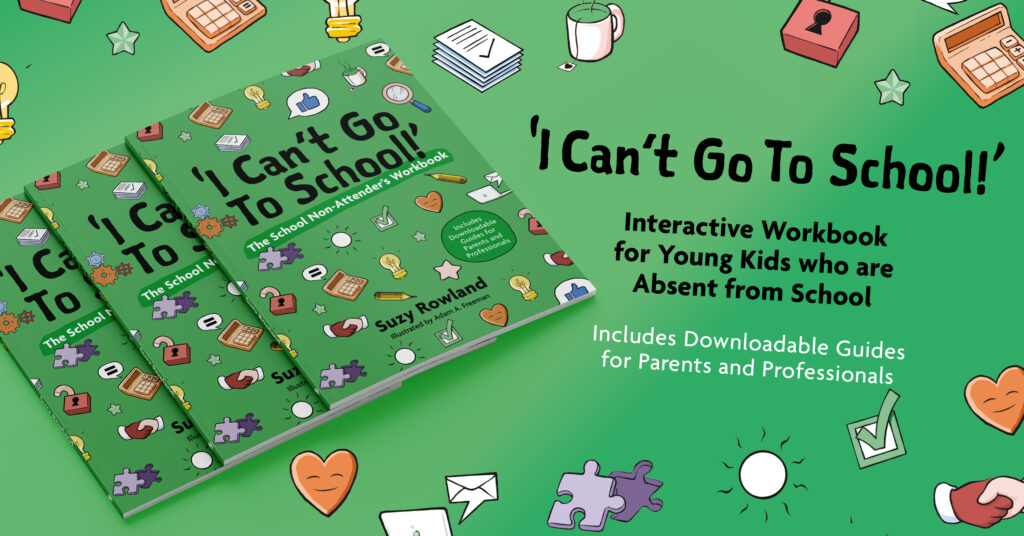
Suzy Rowland shares her experiences of interviewing students who’ve been unable to attend school alongside their parents, and explores what options might be available considering each student’s unique school experience and needs.
“If you really want to understand young people, ask them, never assume!” Insightful words from my friend and colleague Angela, a psychotherapist of 17 years,12 working directly with young people and 7 in Alternative Provision (AP) schools.
Heartfelt conversations
When I was interviewing the young people for my latest book “I can’t go to school!” through those long, disconnected days of lockdown, I shared powerful and immersive experiences with young people and their parents online. I was humbled to hear their stories of school non-attendance, due to a range of issues, including receiving neurodivergent diagnoses, bullying behaviour of their peers, unable to make meaningful friendships, to crippling self-doubt. I have quoted them verbatim in the book, so we can hear their voices. The families were keen to share their stories with me and they believed that sharing them would be a positive experience for other families. They spoke from the heart, detailing difficult experiences and believed that sharing with someone who was listening without judgement, was ultimately positive for other children.
Family ties
Some families had more than one child who was experiencing difficulties with school attendance, although the reasons were different for each sibling. Listening to parents’ experiences was emotional for me, as at the time of writing, my son was struggling with full-time education due to mental health challenges, and we were waiting for an appointment with CAHMS. It was inspiring to be writing the book that would provide a much-needed resource, enabling the young person to talk about and manage their anxieties, when they’re in that lonely no-man’s land between waiting for help and feeling pressured to return to school before they are ready.
Beyond the workbook
Before I started writing the children’s workbook, I worked on the longer of the workbook’s two downloads, which is a fascinating journey into the history of education and how our relationships with the school system have dramatically changed in the last hundred years. Working towards a fulfilling independent life is what school can provide for all children, however a break from the established historical norms, is essential so that children with the whole spectrum of abilities and dis-abilities can thrive. Despite existing laws and protections which are designed to enable the inclusive model of education, many schools hold onto rigid and punitive techniques from a bygone era. These structural barriers while being useful for the management of schools, can be problematic for many other pupils: neurodivergent and neurotypical.
The workbook’s ‘professionals’ download, which is also a great read for parent carers explores:
- the complex dynamics between schools and families
- tips for how teams around the child can formulate individualised plans
- strategies and suggestions for using the children’s workbook
- attachment issues, early trauma
Options Central
The school experience can be traumatic for many families. However, for some parents, taking their children out of school full-time isn’t feasible. Whilst the children’s workbook focuses on young people and their anxious responses to many things school related, I am clear about the role that the politics of the school system plays in this dilemma, and that the traditional ‘schooling’ model doesn’t work for all children/families. What has worked in my experience is:
- Reasonable adjustments (which may not cost a penny if we really listen to the pupil).
- Allow time for the child to heal; they have often been ‘masking’ or managing issues which have lead to their avoidance for several months, even years.
- Recognise every child’s school experience is unique to them.
- Nurture groups are a great peer support for children with a range of anxieties, not only related to neurodiversity.
- Genuine engagement with parents and open listening to children’s concerns.
- Honesty about educational options, some school ‘fit’ better with your child’s personality, making a home-schooling, unschooling, flexi-schooling choice can be the best plan
- Where possible, including the young person in the decisions about their future
Uniquely different
I believe gifting children with tools to recognise and manage their emotional wellbeing is a life skill. One boy I spoke to about his reasons for non-attendance shared his frustration about IT lessons at school: “I can’t learn anything there, I know more than the teachers, what’s the point of going in!?”
As one of my teen girl contributors put it:
“Don’t let anybody’s words upset you and remember that you are always powerful regardless of what anyone says to you, you can do anything that you put your mind to.”
Exactly.
Suzy Rowland is an autism and ADHD Specialist Trainer, Author, Speaker, Cognitive Behaviour Therapist and the founder of the happyinschool project. She wrote the book, ‘I Can’t Go To School’.